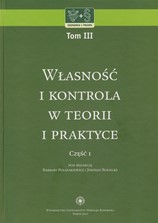WŁASNOŚĆ A NEGATYWNE ASPEKTY KAPITAŁU SPOŁECZNEGO
OWNERSHIP AND NEGATIVE SOCIAL CAPITAL
Author(s): Krzysztof NowakowskiSubject(s): Political Philosophy, Philosophy of Law, Law on Economics
Published by: Wydawnictwo Naukowe Uniwersytetu Mikołaja Kopernika
Keywords: Ownership; negative social capital; property rights theory;
Summary/Abstract: The definition of ownership is conceptually broad and emphasises the legal aspect as well as the social conventions. We use a mainly theoretical inspiration from property rights theory. The transaction cost theory and agency theory are rooted in property rights analysis. In the contemporary economy property rights are not clear not only in developed western country. We cannot ignore the economic and social role of public sphere, separation of ownership and control and more complex property rights. Such phenomenon like cronyism, corruption and clientelism which are a major problem in Eastern Europe and Poland are the result of the property rights and create new form relations of ownership, wealth, new elites and social networks. In the East European liberalisation, privatisation, building of a new legal system and establishing institutions of market economy all take place in the conditions in which there does not exist harmonised standards of behaviour, regulations and procedures adequate for the needs of the new system and promote corruption practices. Ownership of social capital (including negative social capital) apart from traditional economic resources is an important factor, which open new production and consumption possibilities. We try to enrich property rights theories by including questions of social capital, cronyism, clientelism, corruption and social network. Protecting property rights and growth positive social capital can achieve more efficient allocations of resources and increase other opportunities by directing resources to more productive uses, influencing the development of private sector and formation of capital. It is the activation of long-term growth factors and elimination of what is called lost opportunity costs in the economy.
Journal: Ekonomia i Prawo. Economics and Law
- Issue Year: 3/2007
- Issue No: 1
- Page Range: 101-122
- Page Count: 22
- Language: Polish

